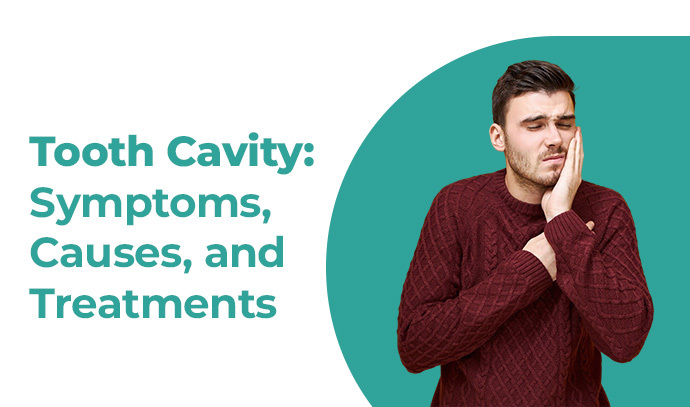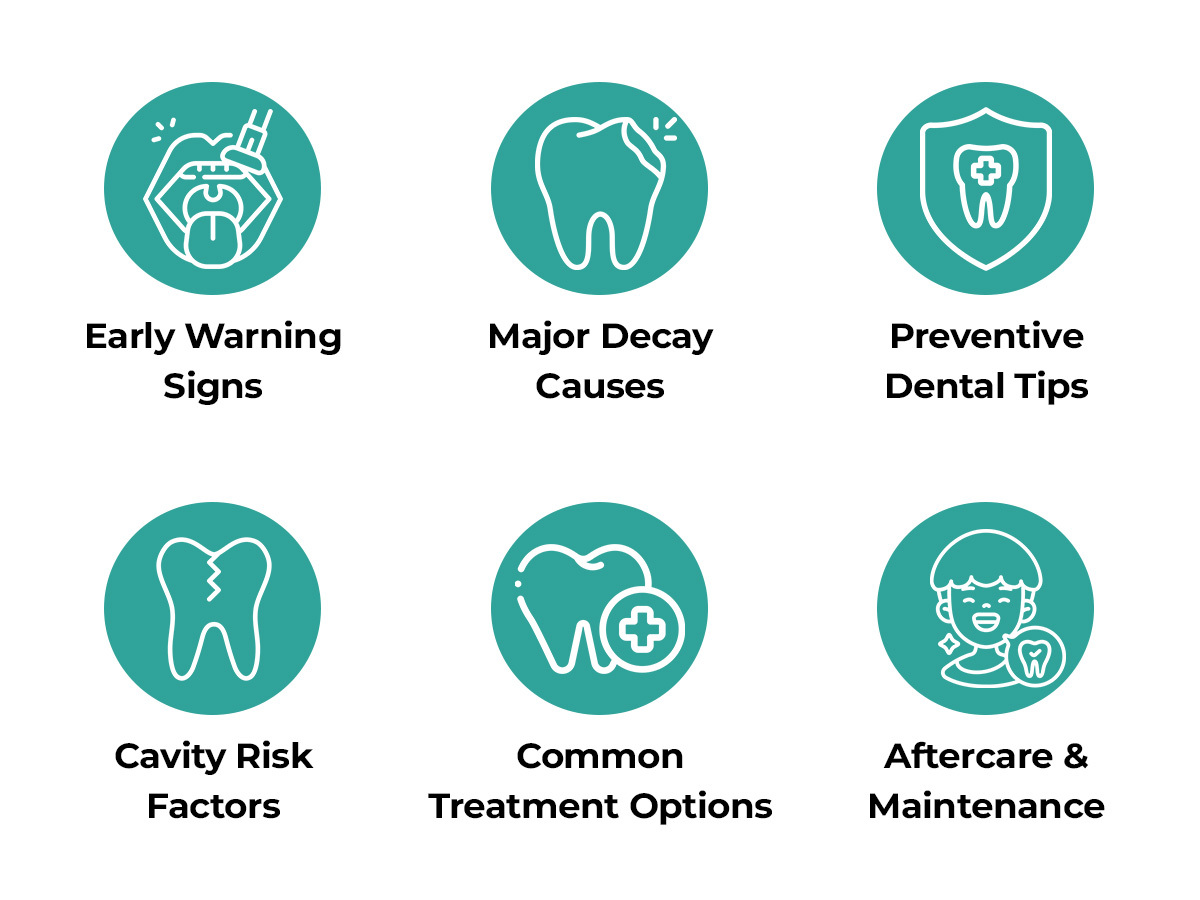
Tooth Cavity: Symptoms, Causes, and Treatments
A dull ache when enjoying a sweet treat or sensitivity to hot and cold beverages can be the first indicators of a much larger oral health concern — a tooth cavity. Tooth cavities, medically known as dental caries, are among the most common dental problems affecting individuals across all age groups. Understanding the cavities symptoms, recognizing the tooth decay causes, and exploring the available treatments are crucial for timely intervention and long-term oral health.
What Is a Tooth Cavity?
A tooth cavity is a permanently damaged area on the surface of a tooth that develops into tiny holes or openings. This damage results from a process called demineralization, primarily caused by bacteria, poor dental hygiene, and frequent consumption of sugary or acidic foods and beverages.
These cavities can start small but, if untreated, can expand and affect deeper layers of the tooth. They can result in infection, severe toothache, and even tooth loss if not addressed on time.
Common Cavities Symptoms to Watch For
Early detection of a cavity can prevent extensive damage and costly procedures. Here are the most typical cavities symptoms:
- Toothache or spontaneous pain
- Sensitivity to sweets, hot, or cold temperatures
- Visible pits or holes in the teeth
- Discoloration (brown, black, or white staining)
- Pain while chewing
- Bad breath or a persistent bad taste in the mouth
Sometimes, symptoms may go unnoticed until the decay has progressed significantly. This underlines the importance of regular dental check-ups.

Leading Tooth Decay Causes
Understanding the root tooth decay causes is key to prevention. Here are the most prevalent reasons behind tooth cavities:
1. Poor Oral Hygiene
Neglecting regular brushing and flossing allows plaque to build up, which is rich in acid-producing bacteria that attack tooth enamel.
2. Frequent Snacking and Sugary Drinks
Sugars from foods and beverages are converted by mouth bacteria into acid, which leads to enamel erosion.
3. Bacterial Growth and Plaque Formation
Plaque hardens into tartar if not removed, providing a base for more bacteria and making it harder to clean the teeth.
4. Dry Mouth (Xerostomia)
Saliva helps wash away food particles and neutralize acids. A dry mouth can increase the risk of cavities due to a lack of natural rinsing.
5. Tooth Location and Structure
Back teeth (molars and premolars) are more prone to decay due to their grooves and difficulty in cleaning.
6. Eating Disorders and Acid Reflux
Conditions like bulimia and GERD expose teeth to stomach acids, increasing decay risk.
Stages of Tooth Decay
Tooth decay doesn’t happen overnight. It progresses through several stages:
- Initial Demineralization – Enamel begins to lose minerals, visible as white spots.
- Enamel Decay – Continued demineralization leads to surface damage.
- Dentin Decay – The inner dentin layer is affected, leading to pain and sensitivity.
- Pulp Involvement – The decay reaches the tooth’s pulp, causing severe pain.
- Abscess Formation – An infection can form at the root, possibly leading to systemic complications.
Diagnostic Procedures for Tooth Cavities
Professional dental evaluation is critical for identifying and assessing cavities:
- Visual Examination – Dentists identify discoloration, holes, and enamel wear.
- Dental X-rays – Essential to detect decay between teeth and beneath fillings.
- Laser Fluorescence Devices – Measure changes in tooth density.
- Cavity Detection Dyes – Highlight decayed areas.
Early diagnosis helps avoid invasive treatments and preserves natural tooth structure.
Treatment Options for Cavities
Depending on the severity and location, cavity treatment may involve various restorative techniques:
1. Fluoride Treatments
For very early decay, fluoride applications help restore enamel.
2. Dental Fillings
Used for treating small to moderate cavities, fillings restore the tooth’s shape and function.
3. Crowns
When large portions of the tooth are damaged, crowns provide full coverage and restore strength.
4. Root Canal Treatment
Necessary when decay infects the pulp. The infected tissue is removed, and the root is cleaned, filled, and sealed.
5. Tooth Extraction
A last resort when the tooth is beyond saving. Alternatives like implants or bridges may be recommended post-extraction.
6. Minimally Invasive Techniques
Technological advances now allow for air abrasion and laser cavity treatment for less pain and precision.
Preventing Tooth Cavities: Best Practices
While modern dentistry provides excellent solutions, prevention remains the best approach.
Daily Oral Care
- Brush at least twice daily using fluoride toothpaste
- Floss daily to remove food and plaque between teeth
- Use antibacterial mouthwashes to reduce bacterial load
- Replace toothbrushes every 3–4 months
Diet and Lifestyle
- Avoid frequent snacking, especially sugary treats
- Drink fluoridated water
- Incorporate teeth-friendly foods like cheese, nuts, and fibrous vegetables
Professional Care
Regular dental visits are non-negotiable for prevention. A dentist in Kannur, or a well-equipped dental clinic in Calicut, can provide preventive care and guidance to ensure lifelong oral health.
Pediatric and Geriatric Cavity Considerations
Children
Children are more susceptible to cavities due to developing brushing habits and frequent snacking. Sealants and fluoride varnishes are effective preventive measures.
Elderly
Older adults may experience increased cavities due to dry mouth from medications or gum recession. Special attention to oral hygiene and diet is crucial.
The Role of Dental Technology in Cavity Management
Modern dental clinics, including those like Elite Dental Studio, use cutting-edge tools such as:
- Digital radiography for precise cavity detection
- Intraoral cameras for real-time monitoring
- Laser dentistry for pain-free cavity removal
These technologies enhance patient comfort and treatment success rates.
Cost Factors in Cavity Treatment
The cost of cavity treatment varies depending on severity, materials used, and clinic location. Patients in Kerala seeking services from a dentist in Kannur, a dental clinic in Calicut, or the best dental clinic in Kochi can expect a range of affordable and advanced care options.
Insurance coverage may reduce out-of-pocket expenses, especially when the treatment is preventive or medically necessary.
Cavity Complications If Left Untreated
Tooth cavities can lead to serious health issues if ignored:
- Chronic pain and infections
- Difficulty eating and speaking
- Tooth loss and shifting of surrounding teeth
- Spread of infection to other body parts (in rare cases)
Protecting Smiles Starts with Awareness!
Tooth cavities are preventable, manageable, and treatable when approached with the right knowledge and action. Recognizing cavities symptoms, understanding tooth decay causes, and taking timely measures are fundamental to optimal oral health.
Routine care, supported by professional check-ups at reliable centers like Elite Dental Studio, helps preserve dental health for years to come. For anyone searching for a trusted dentist in Kannur, a comprehensive dental clinic in Calicut, or the best dental clinic in Kochi, informed decisions can make all the difference.
Frequently Asked Questions:
What are the early signs of a tooth cavity?
Ans. Early signs include tooth sensitivity, mild pain while eating sweets, and visible white or dark spots on the tooth.
How can I prevent cavities naturally?
Ans. Regular brushing, flossing, limiting sugar intake, and visiting a dentist in Kannur or your local clinic for check-ups can help prevent cavities.
Are cavities contagious or hereditary?
Ans. Cavities are not contagious but can be influenced by genetics and shared bacterial transmission in families.
Is it necessary to fill a small cavity?
Ans. Yes, even small cavities should be treated early to avoid deeper tooth decay and costlier procedures later.
Can tooth decay reverse on its own?
Ans. Early-stage demineralization can sometimes be reversed with fluoride and proper care, but actual cavities need treatment.
What’s the best treatment for deep cavities?
Ans. Deep cavities often require fillings, root canal treatment, or crowns, depending on the severity and location of the decay.
Have Dental Problem : Call us
CALICUT: +91 9745 072 555,
KOCHI: +91 9567 124 888
KANNUR: +91 9645874777
or make an Appointment
Take a smiling selfie and we'll Simulate your new smile See What Invisalign treatment could do for you!




